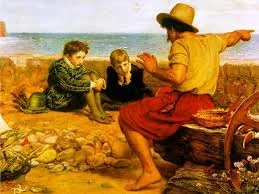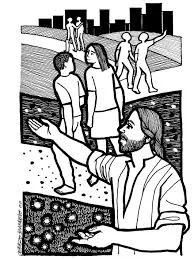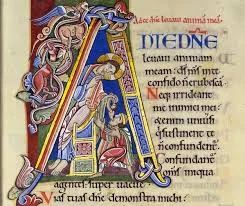This week, our Adult Formation class is finishing up our study of “The Sun Does Shine: How I Found Life and Freedom on Death Row.” In this book, Anthony Ray Hinton tells the story of how he was wrongfully convicted of murder in Jefferson County, Alabama, and sentenced to death. After spending 30 years in a 5’x7’ cell on death row, he was finally exonerated of all charges, and released from prison.
Anthony Ray Hinton’s story did at least two things for me. First, it exposed the appalling level of dishonesty, corruption, apathy, racism, and injustice that was present in the Alabama criminal justice system. It reminded me of how sheltered and privileged I am, and it invited me to honestly reflect on the role I play – through my own apathy and inactivity - in allowing our system to remain so corrupt.
But the story also reminded me that, in the words of Ray Hinton, “God may sit high, but he looks low.” In other words, in the midst of the brokenness of this sinful, fallen world – of which I play a part - the Holy Spirit is still alive and at work. And ultimately, God’s love, mercy, and justice prevail, whether in this life or the next. The redemptive story of Anthony Ray Hinton is living proof that this claim about God sitting high but looking low is not some a pious platitude, but rather, the Gospel Truth.
Our Gospel lesson today is an excellent one to hear as we wrap up this important Adult Formation series. The first line marks the critical turning point of Luke’s gospel story. “When the days drew near for Jesus to be taken up, he set his face to go to Jerusalem.” Jesus’ setting his face towards Jerusalem is such an important detail of this narrative, Luke says it twice. Jesus’ mission and ministry is about to take a drastic turn, and Luke wants to be sure that hearers of this story don’t miss this important point.
At this point in the narrative, the primary purpose of Jesus’ mission and ministry would no longer be teaching, preaching, and healing. Jesus would no longer be itinerantly going from village to village, with a route that resembled the winding, circuitous dotted line from a Family Circus cartoon. In the words of David Lose, Jesus was now on the move. He was headed to a specific place with a specific purpose. Yes, he might continue to preach, teach, and heal. But that would be secondary to his primary mission as he headed to the power center of Jerusalem.
The primary mission that he was setting his face – his entire body - towards, was the journey to Jerusalem, where he, an innocent man, would be tried, convicted, and sentenced to death upon a cross. This redemptive passion and death – and his resurrection three days afterwards - would be the apex moment of the ushering in of God’s kingdom that John the Baptizer foretold when he was baptizing folks in the Jordan River.
Though Jesus struggled at times to accept this divine calling – remember he was fully human too – ultimately he consented to his Father’s will because he knew that this horrific death on a cross would be essential to the ushering in of the Kingdom of God. His death would accomplish what his preaching, teaching, and healing alone could not accomplish. His death on the cross would not only be for the sake of those in his midst, and not only for the sake of Israel. His redemptive suffering and death on the cross would be for the whole world – past, present, and future. Jesus’ redemptive suffering and death on the cross would be for Anthony Ray Hinton…. and those that colluded to unjustly sentence him to death…and his friends on death row who were guilty of the crimes for which they were sentenced to death…and for the victims of those crimes...and for their grieving families. Jesus’ mission to redeem God’s fallen world wasn’t for those who deserved it…after all, nobody deserves it. Actually, those that feel like they are entitled to God’s redemption are the ones who actually need it the most.
This new kingdom that Jesus was ushering in as he set his face towards Jerusalem was not like any other kingdom of the world. God’s Kingdom understood power differently than the kingdoms of the world. In God’s kingdom, the last would be first and the first would be last. The passage in Luke’s gospel that immediately precedes today’s passage is the one where Jesus overhears his disciples arguing over who among them was the greatest. Jesus responded by picking up a little child and saying, “Whoever welcomes this child in my name welcomes me…for the least among all of you is the greatest.” Back then, children weren’t revered the way they are today. They were indeed among the “least of these,” yet Jesus was claiming that in God’s kingdom, the least would be the greatest. He was redefining power.
And another way that the power structure of God’s kingdom that Jesus was ushering in was different from the kingdoms of this world was that it was not violent, wrathful, or vengeful. When James and John asked Jesus if he wanted them to “command fire to come down from heaven and consume [the Samaritan village]” for not welcoming Jesus, they were clearly still operating under the rules world’s kingdom. Perhaps they were not to blame – after all, not long before this story, James and John had just witnessed the Transfiguration of Jesus on top of a mountain. And at the Transfiguration, they saw a vision that included the prophet Elijah. So perhaps when the Samaritan village people rejected them, they remembered when Elijah called fire down upon those who had opposed him. Perhaps they were just offering to do what Elijah had done. But Jesus rebuked them because he rebuked any form of violence, even if it was done in the name of so-called justice. In Luke’s gospel, Jesus forgives his executioners as he is dying upon the cross. Even after all they had done to him, Jesus recognized that real power is the power to love and forgive anybody, under any circumstances.
Anthony Ray Hinton spent three years in silent, righteous anger on Death Row before he was able to re-connect with the Christian faith in which he was raised. But he finally broke his silent anger when the man in the cell next to him got news that his mother died, and sobbed through the night. For the first time in at least three years, Hinton’s heart broke open, and he was overcome with compassion over his neighbor’s inconsolable grief.
About that moment he wrote, “Despair was a choice. Hatred was a choice. Anger was a choice. I still had choices, and that knowledge rocked me. I may not have had as many [choices as people on the outside] had, but I still had some choices. I could choose to give up or to hang on. Hope was a choice. Faith was a choice. And more than anything else, love was a choice. Compassion was a choice…I can’t describe exactly what it is to have your heart break open, but in that moment, my heart broke wide open and I wasn’t a convicted killer on death row; I was Anthony Ray Hinton from Praco. I was my mama’s son.”
And that was the moment that Anthony Ray Hinton broke his silence and said to his neighbor the first words he uttered in that prison in three years: “I’m sorry man, I really am.” And then he yelled out for everyone on Death Row to hear, “Listen! God may sit high, but he looks low. He’s looking down here in the pit. He’s sitting high, but he’s looking low. You’ve got to believe it.”
What Anthony Ray Hinton was modeling for others – those on death row and those on the outside – was his deep understanding of the difference between the power of God’s kingdom and the power of the world’s kingdom. The ultimate power that the world can impose on someone is death – to intentionally take away someone else’s life. And right now in the United States, we exercise that power in the same way that Rome exercised it when they executed Jesus.
Jesus’ disciples James and John knew that they had the power to destroy that entire village, and asked Jesus if he wanted them to exercise that power. Jesus rebuked them for even uttering the idea. James and John ultimately died the same death that Jesus died – execution by the powers of the world. But by the time they suffered their own deaths, they had had the privilege of witnessing what real power looks like – the power of Jesus’ resurrection from the dead. And it was that power that gave them the courage and conviction to die a martyr’s death while spreading the Good News of God’s kingdom here on earth.
Anthony Ray Hinton’s story is a modern-day story of the power of resurrection…of the power of God’s kingdom breaking through and claiming sovereignty over the kingdom of this world. Just as James and John’s hearts were converted to the power of God’s kingdom, so was Anthony Ray Hinton’s. And by sharing his remarkable story through what has now become a national best-selling book, he is doing his part in ushering in God’s kingdom by breaking open the hearts of those of us who read the story.
When Jesus set his face towards Jerusalem, he knew his time had come to fulfill his calling, and he single-mindedly and faithfully responded to that harrowing call. Through our baptisms, we too have a divine call to respond to. By the grace of God, may we set our own faces and bodies towards the places where we can play our faithful part in ushering in the kingdom of God so that love, compassion, forgiveness, and justice become the embodiments of power in our families, churches, communities, nation, and world.










